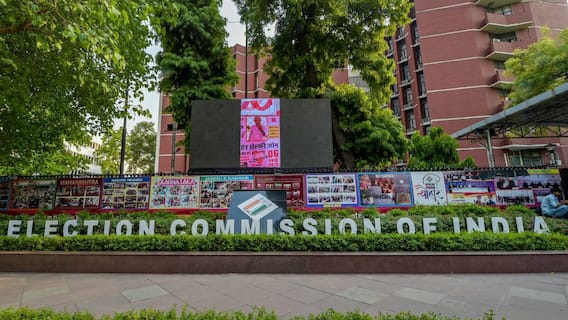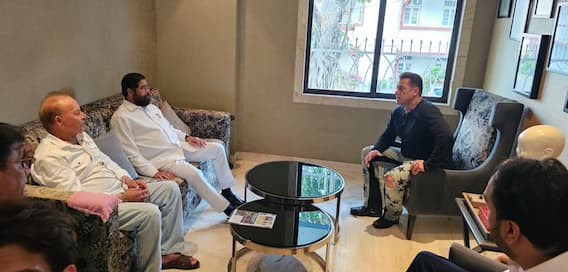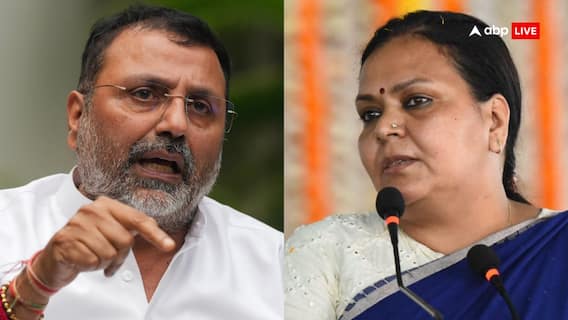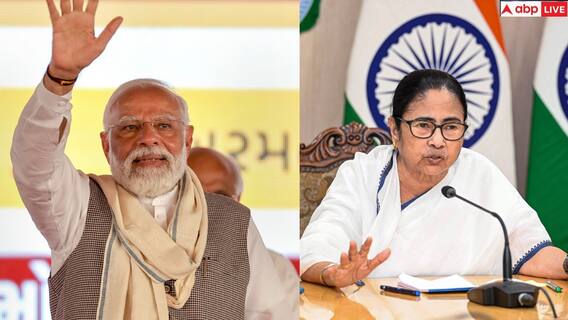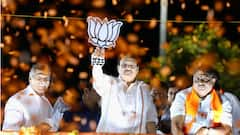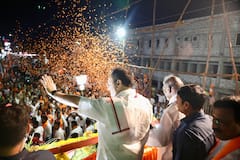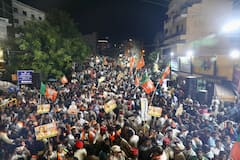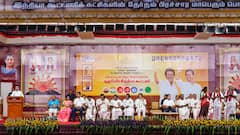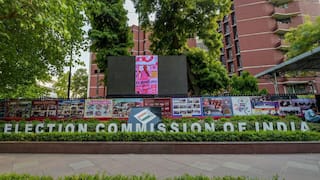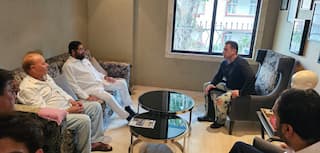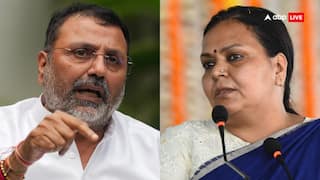Explorer
Advertisement

UP: The process of social change is seldom linear or pretty
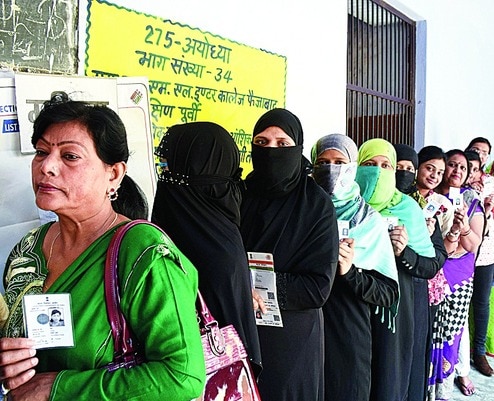
Uttar Pradesh: As the long-drawn-out assembly elections in Uttar Pradesh finally comes to a close, veteran trackers of India's largest and most politically volatile state are gripped by a sense of déjà vu. The language is not quite the same, of course. The Bharatiya Janata Party is no longer crying Ram Mandir (since there is no masjid to demolish any more); the Samajwadi Party is talking laptops and expressways rather than 'social justice' and job quotas; and Mayawati is promising development and not revenge of the oppressed castes.
But for all that, the flavour and the fault-lines that animated the heartland state more than two-and-a-half decades ago seem to have returned with a vengeance. And so have the possibilities of fresh realignments, new coalitions between former partners-turned-bitter adversaries to take on an old foe in new clothes.
The twin forces of Mandir and Mandal unleashed in 1990 had a greater impact on UP than anywhere else, turning the gigantic state with over 400 assembly seats into a raging cauldron of communal and caste politics.
Although L.K. Advani's Somnath to Ayodhya Ram rath yatra in the autumn of 1990 never entered UP - stopped in its tracks by Lalu Prasad at Samastipur in Bihar - the state remained the epicentre of the mandir movement for the next two years. The frenzy whipped up by the Rashtriya Swayamsevak Sangh-Vishwa Hindu Parishad-Bharatiya Janata Party combine in favour of building a grand temple at the "exact spot where Lord Rama was born" and where the 16th-century Babri Masjid then stood fused the 'religious Hindu' and the 'political Hindu' into one pulsating entity. If the political Hindu was always a BJP supporter, millions more - forgetting for a while the harsh realities of social status or economic misery - were caught in a religious fervour and flocked to the saffron camp.
As a result, the BJP swept the 1991 assembly elections in the state, winning221seats and forming its first and only government on its own.
But the BJP failed to consolidate its gains and never again crossed the half-way mark in the UP assembly. One reason was that the demolition of the Babri Masjid put an end to the Ramjanmabhoomi movement and the communal polarization it had spawned. More importantly, Mandal made itself felt in the political landscape of both UP and Bihar. The Mandal Commission report that V.P. Singh decided to implement in 1990 extended reservation in jobs and educational institutions to the other backward classes, over and above the quotas constitutionally mandated for the scheduled castes and scheduled tribes. But the word Mandal came to mean much more than the report itself - it denoted the political assertion and social mobility of erstwhile shudras in the Hindu caste order who had been denied education and its associated benefits for centuries as a result of upper caste hegemony that was still largely intact.
Mandal had the greatest impact on the politics of UP and Bihar, not least because the process of 'mandalization' as it were had begun in both the states from the late 1960s under the leadership of men such as Ram Manohar Lohia, Charan Singh and Karpoori Thakur. After 1990, it gained much greater momentum and became an irreversible force in politics - making it virtually impossible for any upper caste leader to helm either state.
But if the Janata Dal's many offshoots (the Samajwadi Party, the Janata Dal (United), the Rashtriya Janata Dal) became the principal non-upper caste entities in the post-Mandal era, there was another force that complicated - and enriched - the political landscape of UP that was absent in Bihar: the Bahujan Samaj Party. The party set up by Kanshi Ram had Dalits as its core base and, under Mayavati's leadership, witnessed an incredible rise over the last two decades in UP.
It was the rise of the parties championing OBCs and Dalits, and their organic partnership with the minorities, which checkmated the BJP in both Bihar and UP. In the other states of northern and western India where the BJP was up against the Congress - also regarded as (even if benign) upper caste - the BJP had far greater success in consolidating itself.
After winning a majority in UP in 1991, the BJP's tally has steadily fallen. In 1993, it was the single largest party with 177 seats but failed to form the government since Mulayam Singh Yadav and Mayavati, with the support of a severely depleted Congress, joined hands - albeit not for long. In 1996, the BJP was again No.1 with 174 seats, and was initially forced to support Mayavati as chief minister before cobbling together a majority with an assortment of defectors from a range of parties. In the next three assembly elections, the BJP's tally steadily dwindled: 88 seats in 2002, 51 in 2007, and 47 in 2012 while Mulayam, Mayavati, and then Akhilesh ruled one after another.
Once the Ram temple fervour abated and the threat of the BJP receded, differences within the 'forces of social justice', often rooted in personal rivalries, also came to the fore. The BJP made full use of these fissures - joining hands with Nitish Kumar in Bihar after he broke away from Lalu, and propping up Mayavati as chief minister three times: with Mayavati using the stints to push her agenda without compromise and then walking out on her own terms each time.
The urban middle classes often revile Mulayam, Mayavati, Lalu for their compromises and flaws. But then the process of social change is seldom linear or pretty. More often than not, it follows a zigzag path; and personal ambition, nepotism, opportunism, and corruption are often more visible in - but not exclusive to - subaltern leaders new to power and prosperity. Yet that cannot take away from the essentially democratic and progressive trajectory of Mandal and Dalit politics - in contrast to the regressive thrust of the Hindutva offensive that targets the Muslim 'Other' not just to create an overarching Hindu identity but also to suppress challenges from below to the caste order.
Like in the early 1990s, the BJP is once again ascendant in UP, with aggressive communal polarization playing a key role in its election strategy and the 'Modi magic' adding a mesmerizing gloss as the promise of the Ram mandir once did.
It is time, therefore, for the countervailing forces represented by the Samajwadi Party and the BSP to come together again regardless of the election results this Saturday -much like Lalu and Nitish did some time ago. The Mulayam-Mayavati alliance fell apart amid great bitterness in the infamous "guest house incident" on June 2, 1995. But personal rancour tends to wane over time. Mulayam has virtually retired, Mayavati has mellowed, and Akhilesh has called her his bua in the past. Rahul Gandhi, sitting next to Akhilesh at the start of the UP campaign, offered an overture too, saying, "I personally respect Mayavatiji... there can be no comparison between Mayavati and the BJP."
Akhilesh may have forsaken his uncle before the elections. For the long-term interests of Uttar Pradesh, he should consider embracing his adopted aunt.
Follow Breaking News on abp LIVE for more latest stories and trending topics. Watch breaking news and top headlines online on abp News LIVE TV
View More
Advertisement
Advertisement
Advertisement
Top Headline
Election 2024
India
Election 2024
Election 2024
Advertisement
Trending News

for smartphones
and tablets
and tablets



